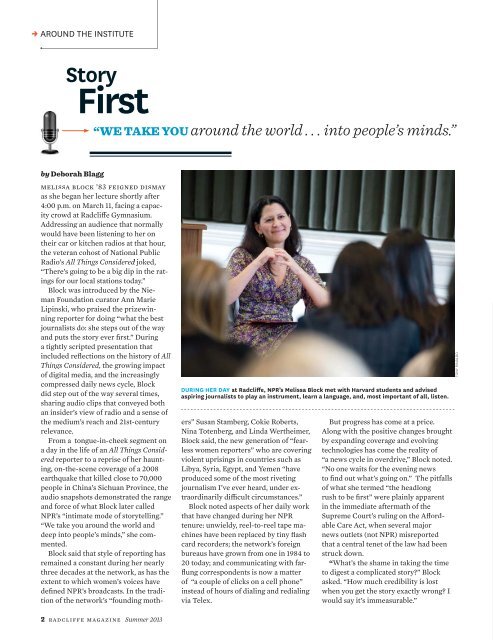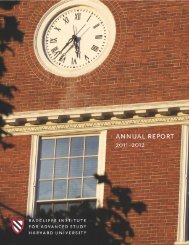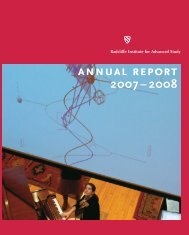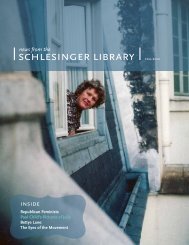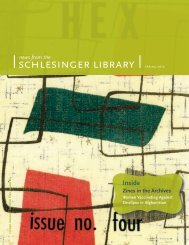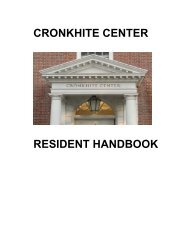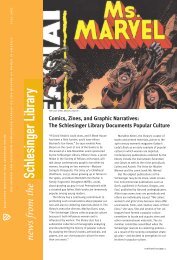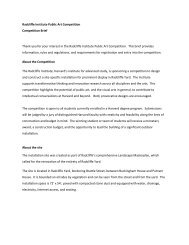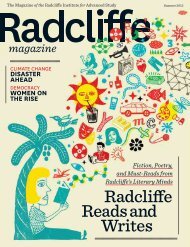Download - Radcliffe Institute for Advanced Study - Harvard University
Download - Radcliffe Institute for Advanced Study - Harvard University
Download - Radcliffe Institute for Advanced Study - Harvard University
Create successful ePaper yourself
Turn your PDF publications into a flip-book with our unique Google optimized e-Paper software.
V AROUND THE INSTITUTE<br />
Story<br />
First<br />
“WE TAKE YOU around the world . . . into people’s minds.”<br />
by Deborah Blagg<br />
Melissa Block ’83 feigned dismay<br />
as she began her lecture shortly after<br />
4:00 p.m. on March 11, facing a capacity<br />
crowd at <strong>Radcliffe</strong> Gymnasium.<br />
Addressing an audience that normally<br />
would have been listening to her on<br />
their car or kitchen radios at that hour,<br />
the veteran cohost of National Public<br />
Radio’s All Things Considered d joked,<br />
“There’s going to be a big dip in the ratings<br />
<strong>for</strong> our local stations today.”<br />
Block was introduced by the Nieman<br />
Foundation curator Ann Marie<br />
Lipinski, who praised the prizewinning<br />
reporter <strong>for</strong> doing “what the best<br />
journalists do: she steps out of the way<br />
and puts the story ever first.” During<br />
a tightly scripted presentation that<br />
included reflections on the history of All<br />
Things Considered, the growing impact<br />
of digital media, and the increasingly<br />
compressed daily news cycle, Block<br />
did step out of the way several times,<br />
sharing audio clips that conveyed both<br />
an insider’s view of radio and a sense of<br />
the medium’s reach and 21st-century<br />
relevance.<br />
From a tongue-in-cheek segment on<br />
a day in the life of an All Things Considered<br />
reporter to a reprise of her haunting,<br />
on-the-scene coverage of a 2008<br />
earthquake that killed close to 70,000<br />
people in China’s Sichuan Province, the<br />
audio snapshots demonstrated the range<br />
and <strong>for</strong>ce of what Block later called<br />
NPR’s “intimate mode of storytelling.”<br />
“We take you around the world and<br />
deep into people’s minds,” she commented.<br />
Block said that style of reporting has<br />
remained a constant during her nearly<br />
three decades at the network, as has the<br />
extent to which women’s voices have<br />
defined NPR’s broadcasts. In the tradi-<br />
tion of the network’s “founding moth-<br />
DURING HER DAY at <strong>Radcliffe</strong>, NPR’s Melissa Block met with <strong>Harvard</strong> students and advised<br />
aspiring journalists to play an instrument, learn a language, and, most important of all, listen.<br />
ers” Susan Stamberg, Cokie Roberts,<br />
Nina Totenberg, and Linda Wertheimer,<br />
Block said, the new generation of “fearless<br />
women reporters” who are covering<br />
violent uprisings in countries such as<br />
Libya, Syria, Egypt, and Yemen “have<br />
produced some of the most riveting<br />
journalism I’ve ever heard, under extraordinarily<br />
difficult circumstances.”<br />
Block noted aspects of her daily work<br />
that have changed during her NPR<br />
tenure: unwieldy, reel-to-reel tape machines<br />
have been replaced by tiny flash<br />
card recorders; the network’s <strong>for</strong>eign<br />
bureaus have grown from one in 1984 to<br />
20 today; and communicating with farflung<br />
correspondents is now a matter<br />
of “a couple of clicks on a cell phone”<br />
instead of hours of dialing and redialing<br />
via Telex.<br />
But progress has come at a price.<br />
Along with the positive changes brought<br />
by expanding coverage and evolving<br />
technologies has come the reality of<br />
“a news cycle in overdrive,” Block noted.<br />
“No one waits <strong>for</strong> the evening news<br />
to find out what’s going on.” The pitfalls<br />
of what she termed “the headlong<br />
rush to be first” were plainly apparent<br />
in the immediate aftermath of the<br />
Supreme Court’s ruling on the Af<strong>for</strong>d-<br />
able Care Act, when several major<br />
news outlets (not NPR) misreported<br />
that a central tenet of the law had been<br />
struck down.<br />
“What’s the shame in taking the time<br />
to digest a complicated story” Block<br />
asked. “How much credibility is lost<br />
when you get the story exactly wrong I<br />
would say it’s immeasurable.”<br />
TONY RINALDO<br />
2 radcliffe magazine Summer 2013


